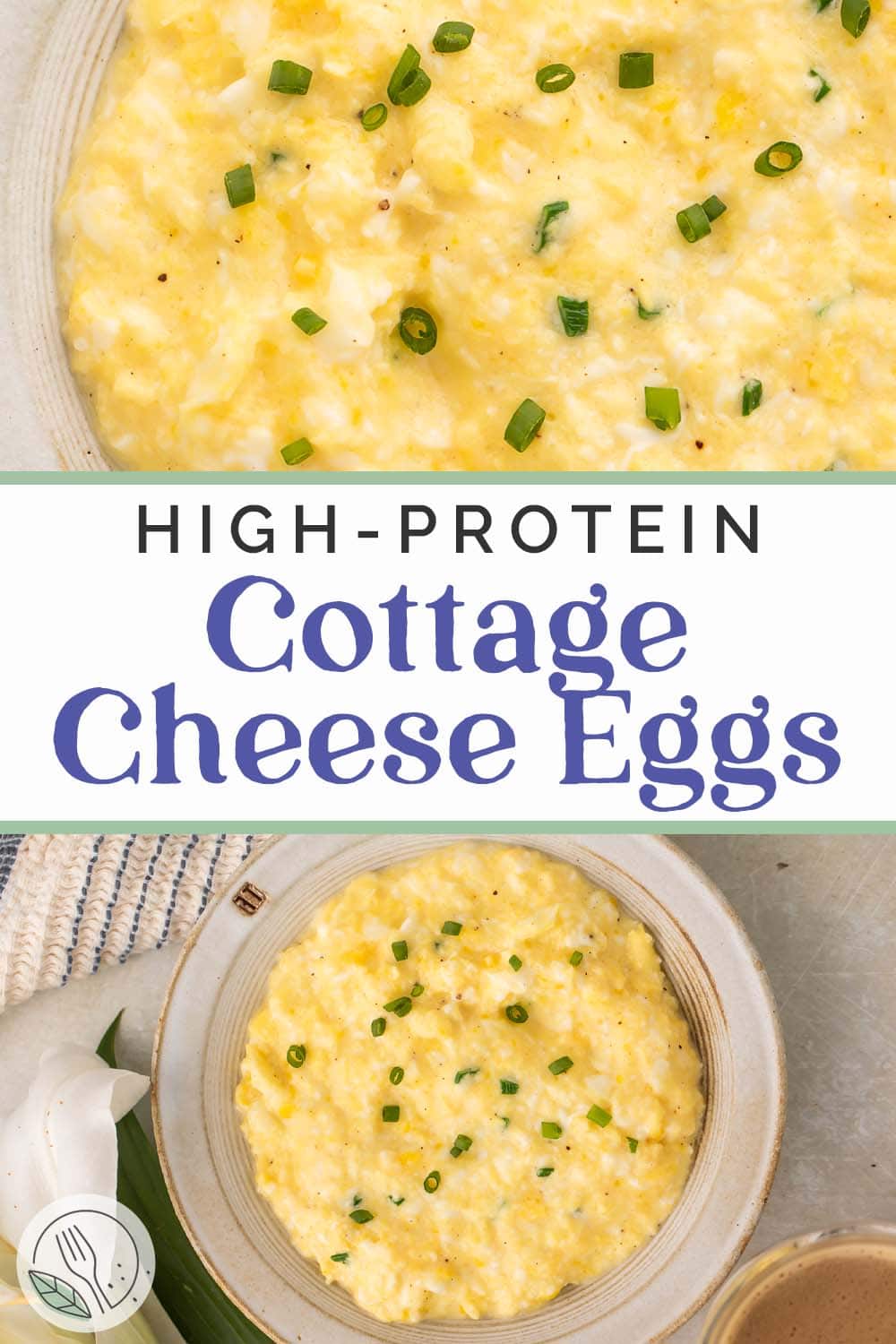Cottage Cheese Eggs
This post may contain affiliate links. Please read our disclosure policy.
These cottage cheese eggs are soft, rich, creamy, and full of flavor! Quick and easy to make, this high protein breakfast keeps you satisfied for a long time, making it a smart but super delicious choice in the mornings. Did I mention how simply good they are too? My new fave!

What We Love About This Recipe
- Adding cottage cheese to scrambled eggs is such an easy thing to do, and it completely transforms the dish! Cottage cheese takes boring scrambled eggs and gives them a rich flavor and creamy consistency, with basically zero extra effort.
- Not only are the eggs creamier and cheesier, but you also get a little extra boost of protein. How much depends on the brand of cottage cheese you use, but most will give you an extra 5-8 grams per serving of cottage cheese eggs. That’s definitely not nothing when you’re trying to hit your macro goals!
Chef’s Tips
- You might see “small curd” and “large curd” cottage cheese on the shelves at your store. Either will work fine here, but “large curd” cottage cheese is usually a little wetter than “small curd”. It also has more of that lumpy cottage cheese texture, but that goes away during cooking.
- To make sure you don’t end up with watery scrambled eggs, use a full-fat cottage cheese. Some brands are just more watery than others, though, so you may want to drain off some of the excess if your cottage cheese seems really liquidy.

More Delicious Egg Recipes
- Sausage & Egg Keto Breakfast Casserole
- Creamy Boursin Scrambled Eggs
- Chicken Omelette
- Instant Pot Scrambled Eggs
- Mom’s Favorite Cheesy Scrambled Eggs
- Shrimp Omelette
- Truffled Scrambled Eggs
- Deviled Eggs
- Air Fryer Hard Boiled Eggs
- Country Omelette
- Perfect Sous Vide Eggs
If you loved this recipe as much as we did, don’t forget to leave us a review below. ★ Follow Easy Healthy Recipes on Pinterest, Facebook, and Instagram, too!
For more delicious recipes, visit our sister sites, 40 Aprons and Easy Cheap Recipes.

Cottage Cheese Eggs
Ingredients
- 4 large eggs
- 1 tablespoon unsalted butter
- ½ cup small-curd cottage cheese full-fat or 2%
- salt to taste
- freshly ground black pepper to taste
- 1 teaspoon chopped fresh chives optional
Equipment
- Small mixing bowl
- whisk
- medium skillet
- Silicone spatula
Instructions
- Crack 4 large eggs directly into small mixing bowl. Vigorously whisk eggs together until fully incorporated, with no streaks remaining. Set bowl aside.
- Place medium skillet on stovetop over medium-low heat. Add 1 tablespoon unsalted butter to skillet and let butter melt completely, swirling and tilting pan as needed to distribute butter across entire skillet.
- When butter has just melted, pour eggs into skillet. Cook eggs, undisturbed, 1 to 2 minutes or until bottom of egg mixture begins to set.
- Add ½ cup small-curd cottage cheese, salt, freshly ground black pepper, and 1 teaspoon chopped fresh chives to skillet and stir to incorporate ingredients into eggs.
- Cook eggs, stirring constantly, 3 to 5 minutes or until eggs are set but still glossy and soft. Note: for firmer scrambled eggs, continue cooking until desired consistency is achieved, stirring eggs constantly.
- Transfer scrambled eggs to serving plates. Serve as desired.
Notes
- Cottage Cheese: Small-curd cottage cheese is typically less watery than large-curd cottage cheese, but some brands are watery regardless. If your cottage cheese seems especially wet, drain the excess liquid before adding it to the skillet.
Nutrition Information
Number of total servings shown is approximate. Actual number of servings will depend on your preferred portion sizes.
Nutritional values shown are general guidelines and reflect information for 1 serving using the ingredients listed, not including any optional ingredients. Actual macros may vary slightly depending on specific brands and types of ingredients used.
To determine the weight of one serving, prepare the recipe as instructed. Weigh the finished recipe, then divide the weight of the finished recipe (not including the weight of the container the food is in) by the desired number of servings. Result will be the weight of one serving.








Leave a Comment